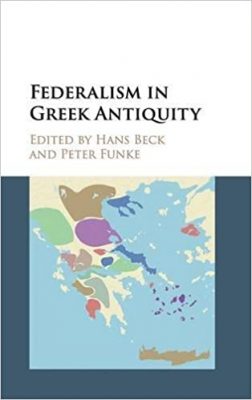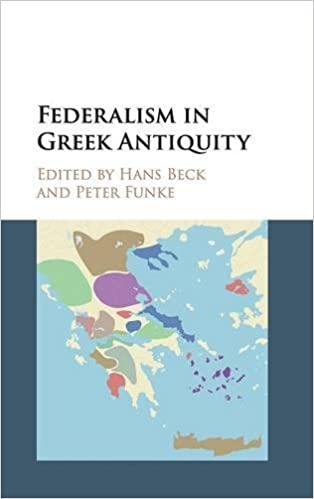 Editors: Hans Beck and Peter Funke
Editors: Hans Beck and Peter Funke
Publisher: Cambridge University Press – 605 pages
Book Review by: Sonu Chandiram
Federalism is a combined form of government with a central (or national) government, along with regional and local governments.
The founding fathers of the United States chose such a type of government as the ideal one for this country and incorporated it in the United States Constitution.
Perhaps they were inspired by the political and governmental success of Greece, wherein some of the power was held by the national government, yet some of the power was shared at the regional and local levels.
In a Wikipedia article, the authors write:
“The Federalist Party was the first political party in the United States. Under Alexander Hamilton, it dominated the national government from 1791 to 1801.
The Federalists called for a strong national government that promoted economic growth and fostered friendly relationships with Great Britain in opposition to Revolutionary France. It controlled the federal government until 1801, when it was overwhelmed by the Democratic-Republican opposition led by President Thomas Jefferson.
The Federalist Party came into being between 1791 and 1794 as a national coalition of bankers and businessmen in support of Hamilton’s fiscal policies. These supporters worked in every state to build a strong, well-organized party committed to a fiscally sound and nationalistic government. The only Federalist President was John Adams. George Washington was broadly sympathetic to the Federalist program, but he remained officially non-partisan during his entire presidency.”
In the US, we have a national seat of power in Washington DC with three branches of government – the Executive, Legislative, and Judicial. There are 50 constituted states headed by governors. As of 2018, there were 3,141 incorporated counties. There were also 19,495 cities, villages and towns, but about three-quarters of these – 14,768 – had fewer than 5,000 people living within them.
This book provides a lot of information on federalism as it developed and evolved in Greece.
Thirty specialists including the two editors, on the subject of federalism and related areas, authored the chapters of this detailed book on the federalist form of government. They are from eight European countries – Cyprus, Denmark, France, Germany, Greece, Italy, Switzerland, and the United Kingdom – and two in North America – Canada and the United States.
Here is an overview of topics discussed in this hefty book, including the history and evolution of ideas and various ethnic leagues as they emerged in different geographical regions of ancient Greece:
- An Introduction to Federalism in Greek Antiquity
- Federalism and Ethnicity
- The Community of the Hellenes
- Akarnania and the Akarnian League
- Aitolia and the Aitolian League
- The Achaian League
- Boiotia and the Boiotian League
- The Eobian League – an ‘Irregular’ Koinon?
- The Lokrians and the Federal Leagues
- Phokis
- Micro-federalism in Ancient Greece: the Dorians and the Oitaians
- The Thessalian League
- The Arkadian Confederacy
- Elis (with Akroria and Pisatis)
- Traces of Federalism in Messenia
- Molossia and Epeiros
- Federal Makedonia
- The Chalkidike and the Chalkideans
- Federalism and the Sea: The Koinea of the Aegean Islands
- Federalism on Crete: The Cretan Koinon and the Koinon of the Oreioi
- The Italiote League and Southern Italy
- The Lykian League
- Federalism in the Kyrenaika?
- Forerunners of Federal States: Collaboration and Integration through Alliance and Archaic and Classical Greece
- The Hellenic Leagues of Late Classical and Hellenistic Times and Their Place in the History of Greek Federalism
- Peaceful Conflict Resolution in the World of the Federal States
- The economics of Federation in the Greek World
- Ancient Theoretical Reflections on Federalism
- Greek Federalism, the Rediscovery of Polybius, and the Framing of the American Constitution
Editors:
Hans Beck is Professor of Ancient History, John MacNaughton Chair of Classics, and Director of Classical Studies in the Department of History and Classical Studies at McGill University in Montreal, Canada.
He is co-author with John Buckler of Central Greece and the Politics of Power in the Fourth Century BC (2008), editor of A Companion to Ancient Greek Government 2013), and co-editor with Antonio Dupla, Martin Jehne, and Francisco Pina Polo, of Consuls and Res Publica: Holding High Office in the Roman Republic (2011).
Peter Funke is Professor and Chair of Ancient History at the Institute of Epigraphy, and the Institute for Interdisciplinary Cypriot Studies at West Falische Wilhelms Universitat in Munster, Germany.
He is co-editor with Nino Luraghi of The Politics of Ethnicity and the Crisis of the Peloponnesian League (2009) and, with Martina Haake, of Greek Federal States and Their Sanctuary, Identity and Integration (2013).






